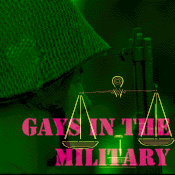 |


|
|
Compiled By GayToday
 Washington, D.C.--For the fifth time, the
United States Supreme Court Monday declined to hear a case challenging the
constitutionality of the military's gay policy.
Washington, D.C.--For the fifth time, the
United States Supreme Court Monday declined to hear a case challenging the
constitutionality of the military's gay policy.
The case involved challenges consolidated on appeal brought by former California National Guard Lt. Andy Holmes and former Navy Lt. Rich Watson. Both had told their respective commanders that they were gay and faced discharge solely for their statements of sexual orientation. In September 1997, the Ninth Circuit Court of Appeals ruled in favor of the government, holding that the court was not in a position to "judge the wisdom, fairness or logic of legislative choices" and that the court owed special "deference" to the military.
"While the decision today is disappointing, it is not a surprise," said C. Dixon Osburn, Co-Executive Director of Servicemembers Legal Defense Network, an independent legal aid organization that monitors "Don't Ask, Don't Tell, Don't Pursue." "The Supreme Court rarely takes a case unless there is disagreement among the appellate courts, and right now, there is none," Osburn added. "The fight for gays in the military, however, continues unabated," Osburn stated. "There is a second wave of litigation being launched that is asking courts to force the Pentagon to enforce its own rules not to ask, pursue and harass service members. And we are winning those cases." On December 23, 1998, a District Court for the District of Columbia ruled in Turner v. Cohen that the Navy had violated the Administrative Procedure Act by giving "absolutely no indication of the grounds" on which it based its decision to uphold Turner's discharge in light of an opinion by the Board for Correction of Naval Records that Turner's discharge was "based on suspicion and rumor and not on credible evidence."
Since that time, gay discharges in the military have steadily increased. In 1997, the last year for which numbers are available, the Pentagon reports that it fired 997 service members for being gay, a 62% increase since the inception of the current policy and the highest number of gay discharges since 1989. |


